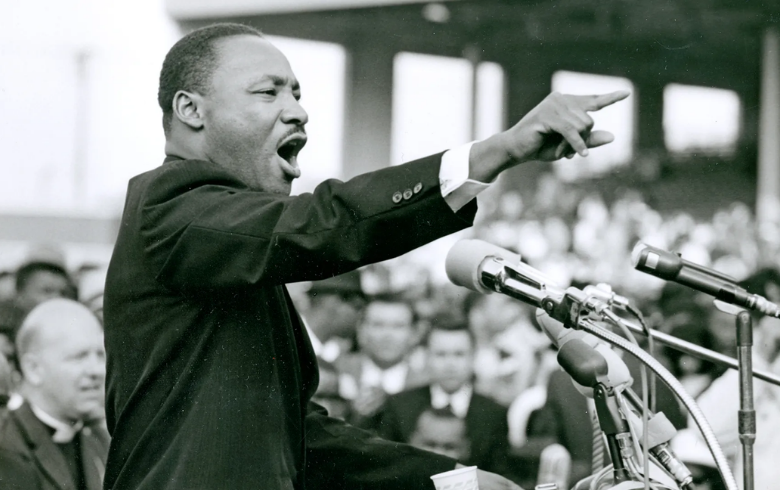Martin Luther King Jr.: A Legacy of Change

Martin Luther King Jr. stands as one of history’s most influential leaders, whose work and words continue to inspire millions worldwide. Born on January 15, 1929, in Atlanta, Georgia, King grew up in a deeply segregated America. Despite the challenges of systemic racism and inequality, he rose to prominence as a leader of the Civil Rights Movement, championing nonviolent resistance and advocating for justice and equality for all.
Contents
Early Life and Influences
Martin Luther King Jr. was born into a family deeply rooted in faith and community service. His father, Martin Luther King Sr., was a Baptist minister, and his mother, Alberta Williams King, was a teacher. Growing up in the South, King experienced firsthand the harsh realities of segregation, which left an indelible mark on his worldview.
King’s education played a significant role in shaping his beliefs. He attended Morehouse College at the age of 15, where he studied sociology. Later, he enrolled at Crozer Theological Seminary and eventually earned a doctorate in systematic theology from Boston University. During his studies, King was profoundly influenced by the teachings of Mahatma Gandhi and the principles of nonviolent resistance.
The Civil Rights Movement
King’s leadership in the Civil Rights Movement began in earnest during the Montgomery Bus Boycott of 1955-1956. Sparked by Rosa Parks’ refusal to give up her bus seat to a white passenger, the boycott became a powerful demonstration of collective action. King, then a young pastor, emerged as a charismatic and determined leader. His eloquent speeches and unwavering commitment to nonviolence quickly garnered national attention.
Key Milestones
| Event | Year | Significance |
|---|---|---|
| Montgomery Bus Boycott | 1955-1956 | Marked the beginning of King’s leadership in the Civil Rights Movement. |
| “Letter from Birmingham Jail” | 1963 | A powerful defense of nonviolent resistance and a call to action. |
| March on Washington | 1963 | Featured King’s iconic “I Have a Dream” speech, drawing over 250,000 attendees. |
| Selma to Montgomery Marches | 1965 | Highlighted the struggle for voting rights, leading to the Voting Rights Act of 1965. |
The Philosophy of Nonviolence
Central to King’s approach was the philosophy of nonviolence. He believed that love and understanding could overcome hate and prejudice. This principle was not merely a tactic but a deeply held conviction. King’s nonviolent methods were inspired by Gandhi’s success in India’s independence movement and were rooted in Christian theology.
The Six Principles of Nonviolence
- Nonviolence is a way of life for courageous people. It is not for the timid or weak.
- The ultimate goal is reconciliation. Nonviolence seeks to create a beloved community.
- Attack the forces of evil, not the people doing evil. The focus is on systemic change.
- Accept suffering without retaliation. Endure hardships for the cause.
- Avoid physical and spiritual violence. Seek to transform, not destroy.
- Have faith that justice will prevail. Maintain hope and belief in the movement’s success.
Challenges and Criticism
While King is celebrated today, his journey was fraught with challenges and criticism. Many viewed his nonviolent approach as too passive, while others accused him of being too radical. The FBI, under J. Edgar Hoover, conducted extensive surveillance on King, labeling him a threat to national security. Despite these obstacles, King remained steadfast, believing that the moral arc of the universe bends toward justice.
The Assassination and Its Aftermath
On April 4, 1968, King was assassinated while standing on the balcony of the Lorraine Motel in Memphis, Tennessee. His death sent shockwaves across the world, but his vision and legacy endured. The Civil Rights Movement continued to push forward, achieving significant legislative victories, including the Fair Housing Act of 1968, passed shortly after his assassination.
Legacy and Impact
Martin Luther King Jr.’s impact on the world cannot be overstated. His leadership not only transformed the United States but also inspired global movements for justice and equality. Today, his birthday is celebrated as a federal holiday in the United States, a testament to his enduring influence.
Key Achievements
- Civil Rights Act of 1964: Prohibited discrimination based on race, color, religion, sex, or national origin.
- Voting Rights Act of 1965: Eliminated barriers to voting for African Americans and other marginalized groups.
- Nobel Peace Prize (1964): Recognized King’s efforts to combat racial inequality through nonviolence.
Lessons for Today
King’s teachings remain as relevant today as they were during the 1960s. In a world still grappling with racial injustice, economic inequality, and political divisiveness, his call for unity, empathy, and action continues to resonate. Individuals and communities can draw inspiration from his example, finding strength in collective action and hope in the possibility of change.
Call to Action
As King famously said during the March on Washington, “I have a dream that one day every valley shall be exalted, every hill and mountain shall be made low.” This dream is not just his; it belongs to all who yearn for a fairer, more just society. Let us honor his legacy by striving to create the world he envisioned, where equality and justice are not mere ideals but realities for everyone.
Martin Luther King Jr. left an indelible mark on history, proving that courage, conviction, and compassion can change the world. His life’s work serves as a beacon of hope and a reminder that progress is possible when people come together to fight for what is right. By embodying his principles and carrying forward his vision, we can continue to make strides toward a more equitable future for all.








